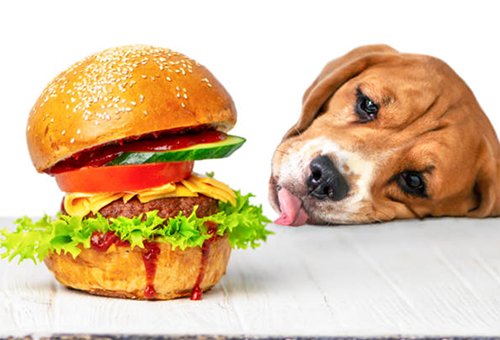Human foods are irresistible to dogs. Most dogs want to eat whatever their owners are eating, no matter what it may be. As dog parents, we commonly come across tomato-based food, and we can't help but ask ourselves, can dogs have ketchup, salsa, and sauce? Can dogs eat tomatoes? The answer is it depends.
Dogs can eat fully ripe (red) tomatoes. In fact, some dog foods even include tomato pomace as an ingredient because it is so nutritious. But are tomatoes completely safe for dogs to eat?
Here's a breakdown of everything you need to know about dogs eating tomatoes.
The Health Benefits Of Ripe Tomatoes
Tomatoes are a very healthy human food that can also benefit a dog's diet. They are packed in antioxidants, and essential vitamins and minerals like potassium, vitamin C, vitamin A, and vitamin K. Here are some health benefits of tomatoes:
- Better Eyesight - A lack of vitamin A leads to many vision problems, such as night blindness and cataracts. Thankfully, tomatoes are full of vitamin A, as well as beta-carotene. Beta-carotene is a potent antioxidant that also helps decrease issues with the eyes and delays macular degeneration.
- Strong Immunity - Lycopene is the phytochemical that gives fresh tomatoes their signature red color. Mostly concentrated in the tomato's skin, this antioxidant fights off harmful free radicals and protects cells in the muscles, heart, blood, lungs, and nerves. It also strengthens bones.
- Healthy Coat and Skin - We already mentioned vitamin A, but vitamins A and C together will keep your dog's coat and skin supple and strong. They also help with joint health and muscle development.
- Strong Heart - Tomatoes have high levels of potassium, which regulates cholesterol levels, blood pressure levels, and blood sugar levels. They also have plenty of iron, which helps with blood circulation, and vitamin K, which helps proper blood clotting. All of these nutrients together make tomatoes a very heart-healthy food.
- Healthy Digestion- Tomatoes are packed with both soluble and insoluble fiber, which can help support healthy digestion and maintain your dog's steady blood sugar level.

Can Tomatoes Be Harmful To Dogs?
Potentially. While it is typically perfectly fine and even healthy for dogs to eat tomatoes, there are a few dangers you should be aware of. For the most part, as long as you stick to only letting your dog eat fully ripe tomatoes, you will be fine. Other potential dangers depend on any other health problems your dog might have.
The Solanine in Tomato Plants
Although tomatoes are technically a fruit, tomatoes belong to the nightshade family of vegetables. The nightshade plants include tomatoes, eggplant, tomatillo, green potatoes, and red bell peppers. Many dogs - and humans - can digest nightshades without a problem, but they do cause issues in some. The side effects can range from just unpleasant to actually dangerous.
Nightshade's family of vegetables contains alpha tomatine and solanine, two toxic compounds. Solanine is incredibly toxic to horses, goats, and other animals. Fortunately, it is not toxic to dogs unless fed in large quantities. Solanine is also typically found in the green parts of the tomato plants, such as the stems and leaves. Green tomatoes or unripe tomatoes have a high level of solanine, and the amount decreases as it matures. So ripe tomatoes are typically safer and nontoxic to eat.
If your dog eats the green parts of the tomato plant or unripened tomatoes, tomato poisoning - also known as tomatine poisoning - can occur. Look for muscle weakness, drooling, difficulty breathing, and general loss of coordination. If you see any of these symptoms, contact your vet immediately. Your vet will determine if your dog is safe and if it's necessary to induce vomiting or additional treatments.
This can also be a concern if you grow tomato plants in your garden. If you have a tomato garden, make sure it's in a pot off the ground or fenced off.
Oxalates
Oxalates are an organic acid found in most plants and are generally not an issue. However, if you have a dog with kidney problems, your dog should avoid all oxalates or consult with your veterinarian.
Allergic Reactions
Tomatoes tend to be a food that triggers allergic reactions in some humans and dogs. While this is rare, there is a risk that your dog can be allergic to tomatoes, even if they are ripe. Signs of an allergic reaction include sneezing, coughing, hives, diarrhea, gas, or itchy skin. If this occurs, contact your veterinarian.
If your dog has a severe allergic reaction that might lead to anaphylaxis, you will need to seek an emergency veterinarian. Signs like swelling, hives, or difficulty breathing can be symptoms of severe allergic reactions.
High Acidity
Tomatoes have a high acidity level. If your dog has gastrointestinal issues or acid reflux, tomatoes can worsen those problems.
How to Feed Your Dog Tomatoes
Before feeding tomatoes to your dog, be sure to choose a ripe, red tomato and remove stems and leaves. Ensure to rinse the raw tomatoes well, especially if it's not organic. Pesticides and herbicides can potentially make your dog sick.
If you choose smaller size tomatoes like cherry tomatoes, it can be a choking hazard. Be sure to slice the tomato before feeding it to your dog.

FAQs
Can Dogs Eat Cooked Tomatoes?
Most cooked tomato products that you will find in stores, such as juices, soups, and sauces, are not healthy for your pet - but not because of the tomatoes. Many of these products are full of added sugars, salt, and artificial flavors. Some of them will also include garlic, onions, and chives, all of which are unhealthy for your pet. For all of these reasons, you should avoid feeding your dog tomato sauce, pasta sauce, and tomato-based soup. If you want to add cooked tomatoes to your dog's diet, prepare them yourself so that you know exactly what ingredients are in them.
Can Dogs Eat Ketchup?
Ketchup is typically acceptable, but you should always read the ingredients list on the ketchup bottle first to determine if it's appropriate for dogs. Avoid any spicy flavors or other flavorings, and don't contain xylitol. Xylitol is an artificial sweetener that can be very dangerous to dogs.
Can Dogs Eat Canned Tomatoes?
Canned tomatoes, and canned foods in general, are very high in sodium. Too many canned tomatoes will lead to dehydration. Watch out for symptoms such as increased urination, excessive thirst, upset stomach, fever, loss of appetite, and nausea. If possible, it's best to avoid canned tomatoes and offer a fresh ripe tomato instead.
Can Dogs Eat Cherry and Grape Tomatoes?
There are so many different varieties of tomatoes, but rest assured that none of these are unsafe for your dog. Grape tomatoes, cherry tomatoes, beefsteak tomatoes - all of these tomatoes are safe to feed your dog as long as they are ripe. However, keep in mind that the smaller tomatoes may be a potential choking hazard, so consider halving them before feeding them to your dog.
Can Dogs Eat Sun-Dried Tomatoes?
If the sun-dried tomatoes don't contain any additive ingredients, you can give a small amount to your dog. It is important to keep in mind that they contain more calories and more sugar than fresh tomatoes because they are dehydrated. If your dog has underlying health conditions, you should consult with your veterinarian first.
What Underlying Health Condition Dogs Should Avoid Tomatoes?
Dogs with kidney issues or arthritis should avoid tomatoes. Tomatoes have oxalates, which should be avoided for dogs with kidney problems. And because tomatoes are in the nightshade family, they can exacerbate arthritis symptoms.
If your dog has diabetes, is overweight, or has been diagnosed with other diseases or illnesses, it is best to consult with your veterinarian.
Summary
While tomatoes are delicious and a healthy treat, they should never replace your pet food. It's always best to check with your veterinarian first to determine if you should give tomatoes to your dog. When giving tomatoes to your dog, be sure it is clean, fully ripe, and size appropriate.
